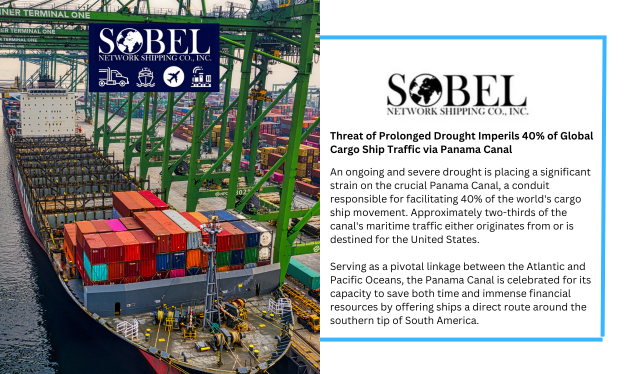An ongoing and severe drought is placing a significant strain on the crucial Panama Canal, a conduit responsible for facilitating 40% of the world’s cargo ship movement. Approximately two-thirds of the canal’s maritime traffic either originates from or is destined for the United States.
Serving as a pivotal linkage between the Atlantic and Pacific Oceans, the Panama Canal is celebrated for its capacity to save both time and immense financial resources by offering ships a direct route around the southern tip of South America. However, the functioning of the Panama Canal system critically relies on the levels of its interconnected lakes, which are currently hovering at alarmingly low levels, cautioned Boris Moreno, the canal’s Vice President of Operations.
The geographic zone encompassing the canal is grappling with an unparalleled period of arid conditions, leading to a substantial reduction in water levels within the canal. This phenomenon is of great concern since the canal’s operations heavily depend on the availability of fresh water. As a result, the daily operations of the canal have been disrupted, causing a decrease in the number of vessels transiting each day from 36 to 32. Consequently, maritime delays and congestion have ensued.
Moreover, in order to prevent grounding due to shallow waters, certain vessels are compelled to carry up to 40% less cargo.
The process of maneuvering ships through the canal’s intricate system of locks necessitates vast quantities of fresh water, varying from 55 to 125 million gallons per vessel, contingent upon its size. Traditionally, a substantial portion of this water is released into the ocean. In response to the crisis, the Panama Canal Authority is implementing measures to conserve and recycle a portion of this water.
In light of the circumstances, the authority is contemplating strategies such as redirecting water from alternative rivers and constructing supplementary reservoirs. This is particularly significant as the lakes that supply the canal also function as the primary drinking water source for the neighboring Panama City.
With the advent of climate change bringing heightened temperatures and prolonged dry periods to tropical regions, the long-term sustainability of the canal is now a matter of global concern.
Ricaurte Vasquez Morales, the canal’s administrator, emphasized, “Our reliance on climate patterns makes the issue of climate change undeniably pertinent.”
Antonio Dominguez, the managing director of shipping giant Maersk, which stands as the canal’s largest user, voiced apprehensions about the potential consequences of an extended drought. These concerns encompass delays, escalated shipping costs, and potential repercussions on goods such as holiday merchandise, ultimately contributing to elevated consumer prices.


